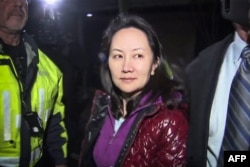Canadian Prime Minister Justin Trudeau says his government is trying to get more information about a third Canadian citizen detained in China.
Two others were taken into custody shortly after Canadian police arrested a top Chinese telecom executive on a U.S. warrant Dec. 1.
Meng Wanzhou is accused of evading U.S. sanctions against Iran.
Trudeau said during a news conference Wednesday he does not believe the third detention of a Canadian has any ties to the other cases, calling it "a very separate case."
He was asked why his government appears not to be doing more to get the Canadians freed.
"Canadians understand that even though political posturing might be satisfactory in the short term to make yourself feel like you're stomping on a table and doing something significant, it may not directly contribute to the outcome we all want," he said.
Although Canadian officials have not directly tied the detentions in China to Meng's arrest, former Canadian ambassador to China, David Mulroney, finds that unlikely.
"One detention is bad enough. Two is terrible. Three underlines how ruthless China can be. It serves as a reminder for people that China is a detention state," he said.
Along with the third still-unidentified Canadian, former diplomat Michael Kovrig and business consultant Michael Spavor are also being detained.
The Chinese foreign ministry said they are accused of endangering China's national security. It has given no other information.
Meng Wanzhou is the chief financial officer of Chinese telecom giant Huawei Technologies, one of the world's biggest manufacturers of mobile phones.
U.S. officials say she lied to banks about Huawei's control of Hong Kong-based Skycom — a company that allegedly sold U.S. goods to Iran in violation of U.S. sanctions.
Meng is out on bail in Vancouver while she awaits a hearing on extradition to the United States.
China has warned Canada of "grave consequences" if it does not free Meng.
President Donald Trump told Reuters last week that he would personally intervene in the Meng case if it would benefit U.S. national security or help close a trade deal with China.
















